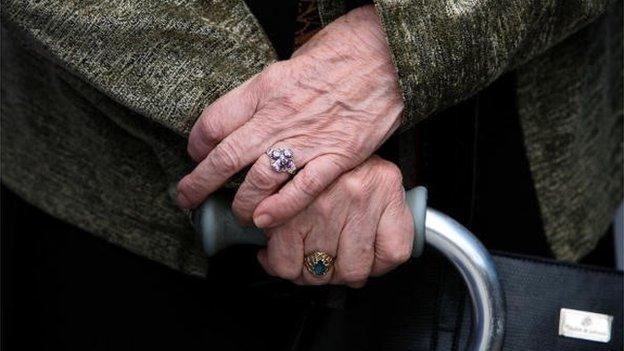Budget 2014: The chancellor's plan to unlock pensions
- Published

The planned pension changes will make a big difference to new pensioners
A massive reform of pensions has been announced by the government which will change the way many people fund their retirement.
The new proposed rules will come in from April 2015, but some of the current rules will be relaxed from 27 March, 2014.
The changes affect those over 55 who have savings in a defined contribution (DC) pension scheme, such as a personal pension. In a DC scheme, the pension depends on the amount of money you, and perhaps your employer, have saved in the scheme.
The position for those in defined benefit (DB) - or final salary - pensions is unlikely to change, although there may be a restriction preventing people in public service pension schemes from transferring into a DC scheme.
Temporary rules
The chancellor announced plans for some temporary rules until the full proposed reforms come into force. These will run from 27 March, 2014 to 6 April, 2015
If you are aged over 60 and have not touched your pension pot, and your total pension savings are no more than £30,000, you can withdraw all of the savings.
The first 25% of the money you take out is tax-free, and the rest is taxed as the top slice of your income in the tax year of withdrawal.
To take some fictional examples: Clara is 62 and has no other income, but does have a £20,000 DC pension pot. She withdraws all £20,000 in one year. She receives £5,000 (25%) tax-free and pays no tax up to her personal allowance of £10,000. She pays 20% tax on the remaining £5,000.
Denise's pension pot is also £20,000. She is still working, and earns £65,000 a year. She decides to empty her pension pot. Like Clara, the first £5,000 would be tax-free, but the balance of £15,000 is taxed at 40%, because she has already used all her basic rate tax band.
If you want to take advantage of the new rules, you should first check what tax you will pay on the money you take out.
If you have a pension which is in "capped drawdown", so that you are taking some money out each year, the amount you can withdraw from your drawdown fund will increase from 120% to 150%.
Alternatively, if you are in capped drawdown and have at least £12,000 a year of "secure pension income", including the state pension and annuities in payment, you can move to "flexible drawdown" which gives you complete freedom over how much you take out of the pension pot.
Before 27 March you could only move to flexible drawdown if you had secure pension income of at least £20,000 a year. Remember that any money you take out of your drawdown fund will be taxed at your marginal rate, so you may want to take the money out in stages so as to minimise the tax cost.
The planned new rules
The government is consulting on the rules which will apply from 6 April, 2015, but it is expected that you will be able to take your entire DC pension savings as a lump sum and spend or invest it as you like, as long as you are over 55.
Up to 25% of the money will be tax free, as now, but the balance will be subject to tax at your marginal rate.
For example, Emily is 60 and has taxable income of £50,000. She has £250,000 in her pension pot, and takes all this money out on 7 April, 2015. She will receive £62,500 without tax (25%) and the balance will be taxed at a mixture of 40% and 45%. She also loses her personal allowance because her total taxable income is over £100,000.
She would have paid less tax if she had spread the withdrawals over several years.
What now?
There is very little time left in this tax year - only just over a week between 27 March and 4 April. If you want to take out some money from your pension using the rules which apply from 27 March, you should contact your pension scheme or adviser without delay.
It will be very challenging for these companies to deal with the flood of requests they are likely to receive.
Meanwhile, if you have already used your pension savings to obtain an annuity, then this change is not expected to affect you. You will continue to get your annuity from your pension provider as before.
These changes give pension savers control over their pension pots. But do not forget that taking the money out now may trigger a tax charge. You should check out how much the tax will be before you take the money.